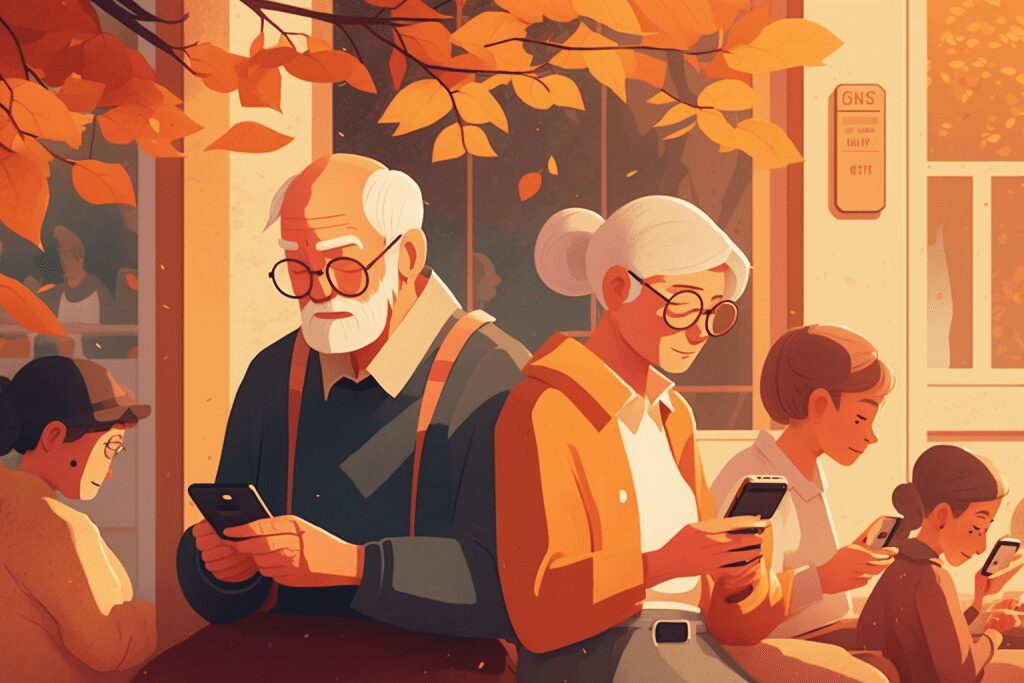The dawn of the digital age has revolutionized many sectors, and marketing is certainly no exception. With the influx of technology, marketers have had to adapt and evolve in unprecedented ways. This change has been especially true in the senior living sector, where the potential of Artificial Intelligence (AI) is beginning to show its true colors.
AI is redefining the norms of senior living marketing, crafting strategies and delivering personalized experiences that would have been unimaginable just a few years ago. Gone are the days when marketing was a one-size-fits-all approach. Today, AI enables us to meet our audiences on their terms, fostering a level of engagement that truly stands out in the competitive market landscape.
Artificial Intelligence, specifically Machine Learning (ML), is enabling a whole new level of personalization in marketing. By analyzing a plethora of data points, Machine Learning can predict preferences and behaviors, allowing for a customized marketing approach that’s tailored to individual needs and interests.
Consider the example of a prominent senior living community, who adopted AI to enhance their marketing strategies. They utilized Machine Learning to analyze the online behavior of their audience and were able to identify common themes and interests. This data was then used to personalize their marketing efforts, leading to a significant increase in engagement and conversions.
For instance, by analyzing data such as website visits, brochure downloads, and email interactions, predictive analytics can anticipate the needs and preferences of potential residents. This intelligence empowers senior living marketers to create personalized campaigns that are more likely to resonate with their target audience, optimizing resource allocation and maximizing ROI.
The Senior Living Market
The Senior Living Market is a dynamic and evolving industry that caters to a unique demographic: seniors. As this group continues to grow and evolve, the need to understand and respond to their distinct needs and preferences becomes increasingly vital. The success of any senior living community hinges on its ability to do just that, particularly in terms of marketing strategy.

Understanding the Needs and Preferences of Seniors
Seniors constitute a diverse demographic with varying needs, preferences, and lifestyles. Despite this diversity, there are some general trends and patterns that provide valuable insight for marketing initiatives. Seniors, for instance, value trustworthiness, security, and quality of life. They want to know they’re making a wise investment when choosing a senior living community.
Moreover, while seniors are often stereotyped as being technologically averse, the reality is quite different. More and more seniors are embracing technology. They are actively using smartphones, tablets, and social media platforms, making them an audience that can be effectively reached through digital marketing channels.
It’s crucial to grasp the demographic and psychographic profiles of seniors when delving into the senior living market. Seniors represent a diverse demographic, varying in age, health status, lifestyle preferences, and financial capability. Psychographically, seniors tend to value independence, comfort, social engagement, and safety in their living conditions.
Moreover, seniors’ media consumption habits and marketing preferences are changing. More seniors are becoming digitally savvy, with a significant number using the internet, social media, and mobile devices regularly. They are no longer restricted to traditional forms of media like television or print; digital platforms are increasingly becoming the norm.
Marketing preferences of seniors lean towards trustworthiness and authenticity. They prefer transparent communication that resonates with their experiences, concerns, and aspirations. They appreciate thoughtful, personalized messages over generic marketing pitches.
The Importance of Personalized and Digital Marketing in Senior Living
As the senior living market becomes more competitive, personalization and digitization are becoming crucial differentiators. Seniors, like any other consumers, appreciate when brands understand and cater to their unique needs. A one-size-fits-all approach no longer cuts it. Personalized marketing makes seniors feel valued and understood, which significantly impacts their decision-making process.
Digital marketing plays a pivotal role in facilitating this personalized approach. Through digital platforms, marketers can collect and analyze data to gain a deep understanding of seniors’ behavior and preferences. This information can then be used to tailor marketing strategies that resonate with them on a personal level.
The demographic and psychographic complexities of seniors underscore the importance of personalized and digital marketing in senior living. Personalization entails customizing marketing messages to align with the individual preferences and needs of seniors, which significantly increases engagement and satisfaction.
On the other hand, digital marketing empowers senior living providers to reach out to seniors where they are most active. With more seniors embracing digital platforms, providers have the opportunity to connect with their target audience in a more direct and interactive manner.
In summary, personalized and digital marketing are not just trends in the senior living industry. They are essential strategies that ensure marketing efforts resonate deeply with the seniors, fostering trust, and promoting engagement.
Unpacking AI and Its Impact on Marketing
Artificial Intelligence (AI) has been making waves across industries, from healthcare to finance, and marketing hasn’t been left behind. It’s brought about a sea change, reshaping strategies, and helping businesses reach out to their audience more effectively. As we delve into the world of AI, it’s crucial to comprehend its basics and understand the revolutionary impact it’s had on the marketing landscape, particularly in the digital realm.
Exploring the Basics of AI
In its simplest form, Artificial Intelligence (AI) refers to the simulation of human intelligence processes by machines, especially computer systems. These processes encompass learning (acquiring information and understanding it), reasoning (using rules to reach approximate or definite conclusions), and self-correction.
AI can be categorized broadly into two types: Narrow AI and General AI. Narrow AI is designed to perform a specific task, such as voice recognition. An example of this is Siri, Apple’s voice-activated personal assistant. Narrow AI operates under a limited set of constraints and is the type most commonly seen and used in our everyday lives, including marketing applications.
On the other hand, General AI, also known as strong AI, can understand, learn, adapt, and implement knowledge across a wide range of tasks at a level equal to or beyond a human being. However, this type of AI, commonly portrayed in science fiction, does not currently exist.
One significant branch of AI is Machine Learning (ML), where computer systems are trained to learn from data, improving their performance over time without being explicitly programmed. This self-learning capability of ML has made it a crucial component of many AI applications.
Another essential AI technology relevant to marketing is Natural Language Processing (NLP). It enables AI to understand, interpret, generate, and respond to human language in a valuable way, forming the backbone of AI tools like chatbots and voice assistants.
In essence, AI involves building and programming computers to mimic human intelligence, enabling them to solve complex problems, recognize patterns, and process information in a way similar to human brains. As AI technologies continue to evolve, they are becoming increasingly integral to various aspects of life, including how businesses market their products and services.
AI’s Game-Changing Role in Digital Marketing
In the dynamic world of digital marketing, AI has proven to be a game-changer. It’s transformed everything from analytics to automation, bringing an unprecedented level of sophistication and efficiency.
AI has automated routine tasks, freeing marketers to focus on strategic and creative aspects of their campaigns. It has also revolutionized analytics, leveraging big data to provide actionable insights about consumer behavior and market trends.
Through Machine Learning, AI offers personalization at scale. It helps businesses tailor their marketing messages based on individual consumer behavior and preferences, enhancing the customer experience and boosting engagement. AI chatbots, another prominent application, provide instant, personalized customer service, improving interactions and building relationships with customers.
In conclusion, the influence of AI on digital marketing is profound. As technology continues to advance, its impact on marketing strategies and outcomes will only grow, paving the way for even more innovative and effective engagement with consumers.
The Future of AI in Senior Living Marketing
The future of AI in senior living marketing is exceptionally promising, with technologies revolutionizing how services are marketed and delivered. AI applications will streamline lead generation and engagement by leveraging machine learning algorithms to predict behaviors and preferences.
AI chatbots, for instance, can engage with potential residents 24/7, answering questions, providing personalized information, and setting appointments. Advanced data analytics will enable targeted advertising, enhancing the efficiency of marketing campaigns.

Emerging AI Technologies and Their Potential Impact
Artificial Intelligence (AI) is an ever-evolving field, with new technologies continually emerging, each with potential implications for various sectors, including senior living marketing. Here are some of the emerging AI technologies that promise to shape this industry’s future.
1. Advanced Predictive Models: As AI progresses, so do predictive models. Leveraging large data sets, these models are becoming increasingly proficient at forecasting trends and behaviors. In senior living marketing, they could enable marketers to predict the effectiveness of various strategies, allowing them to make data-driven decisions and optimize their approach.
2. AI-Powered Virtual Reality (VR): Virtual Reality isn’t new, but the integration of AI is a promising advancement. With AI, VR can offer personalized virtual tours of senior living communities, adapt to user reactions in real-time, and provide detailed feedback to marketers. This fusion could help seniors make informed decisions about their living options, thus improving conversion rates.
3. Natural Language Processing (NLP): This technology allows AI to understand and respond to human language in a more sophisticated manner. In the future, this could lead to chatbots and voice assistants that understand and respond to complex queries, providing a more human-like interaction. This capability would enhance customer service and improve overall user experience.
4. AI-Enabled Personalization: Personalization is already a significant trend in marketing, but with AI, it can be taken to the next level. AI can analyze a vast amount of data about customer behavior and preferences, enabling marketers to create highly personalized experiences. In the context of senior living, this could mean personalized content, recommendations, and interactions tailored to each individual’s needs and preferences.
As these technologies continue to evolve, they hold the promise of revolutionizing senior living marketing, creating more efficient, effective, and personalized experiences.
How to Prepare for the AI Revolution in Senior Living Marketing
Preparing for the AI revolution requires a proactive and open-minded approach. Embracing the AI revolution in senior living marketing might appear daunting, but it doesn’t have to be. Here are some practical steps to help marketers prepare and make the most of the transformative potential of AI.

1. Stay informed: The first step is to stay abreast of the latest AI trends and their implications for senior living marketing. This means regularly reading industry reports, attending webinars, joining forums, and participating in discussions about AI in marketing.
2. Invest in AI technologies: Consider what AI tools could help you achieve your marketing goals. This might involve investing in AI-powered marketing platforms, predictive analytics tools, or chatbots. Each of these technologies can provide a significant boost to your marketing efforts.
3. Leverage data: AI thrives on data. To leverage AI effectively, you need a robust data strategy. This involves collecting data about your target audience, analysing it, and using the insights to inform your marketing strategies. Data privacy should be a priority in this process.
4. Embrace experimentation: AI is a rapidly evolving field, and what works today might not work tomorrow. To stay ahead, it’s important to maintain a culture of experimentation. Try new AI tools, test different strategies, and be prepared to learn from both successes and failures.
5. Collaborate: You don’t have to navigate the AI revolution alone. Consider collaborating with AI specialists or digital marketing agencies that have experience in leveraging AI in the senior living sector. Their expertise can provide valuable insights and help you avoid common pitfalls.
Conclusion
AI is undeniably transforming the landscape of senior living marketing. From personalization to predictive analytics and chatbot technology, AI is enabling marketers to connect with their audience in a more meaningful and efficient manner. As the digital landscape continues to evolve, AI stands as a beacon of innovation, paving the way for revolutionary changes in how senior living communities reach out to and engage with potential residents.
Looking ahead, the influence of AI on senior living marketing is set to increase exponentially. The emergence of advanced predictive models, AI-powered VR, and more sophisticated chatbots signal an exciting future. As such, it’s crucial for marketers in this sector to keep abreast of these trends and consider how to incorporate AI into their strategies effectively. Doing so will not only enhance their marketing efforts but also contribute to a richer, more personalized experience for seniors.
FAQs
What are the top AI trends in senior living marketing?
The top AI trends in senior living marketing currently include personalization through machine learning, AI chatbots for enhanced customer interaction, and predictive analytics for strategic planning. Future trends point towards advanced predictive models, AI-powered virtual reality, and natural language processing-enhanced chatbots.
How is AI transforming senior living marketing?
AI is revolutionizing senior living marketing in several ways. It’s enabling personalization at scale, allowing marketers to tailor their messages based on individual preferences and behaviors. AI is also improving customer interaction through chatbots that provide instant, personalized responses. Lastly, predictive analytics is allowing marketers to anticipate future trends and behaviors, enabling strategic decision-making.
How can senior living marketers prepare for the AI revolution?
Senior living marketers can prepare for the AI revolution by staying informed about the latest AI trends, investing in the right AI tools, and fostering a culture of experimentation. Embracing AI doesn’t mean abandoning existing strategies; rather, it’s about enhancing them with the capabilities that AI offers.
Is AI complicated to implement in senior living marketing?
While AI may seem daunting, its implementation in marketing is facilitated by various tools and platforms designed for non-technical users. Moreover, many AI applications in marketing involve technologies that marketers already use, such as Google Analytics or CRM systems. It’s more about leveraging these tools to their full potential with AI’s capabilities.
Reference
- https://seniorlivingmarketers.com/
- https://www.bu.edu/
- https://www.bildandco.com/
